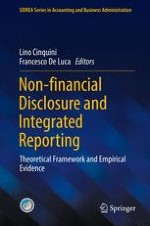2022 | OriginalPaper | Chapter
Harmonisation or Standardisation of Non-financial Reporting in European Union: The Role of Regulation
Authors : Silvia Testarmata, Mirella Ciaburri
Published in: Non-financial Disclosure and Integrated Reporting
Publisher: Springer International Publishing
Activate our intelligent search to find suitable subject content or patents.
Select sections of text to find matching patents with Artificial Intelligence. powered by
Select sections of text to find additional relevant content using AI-assisted search. powered by
